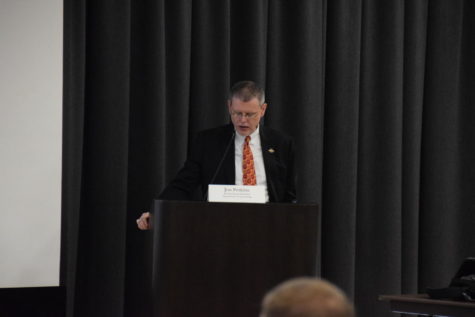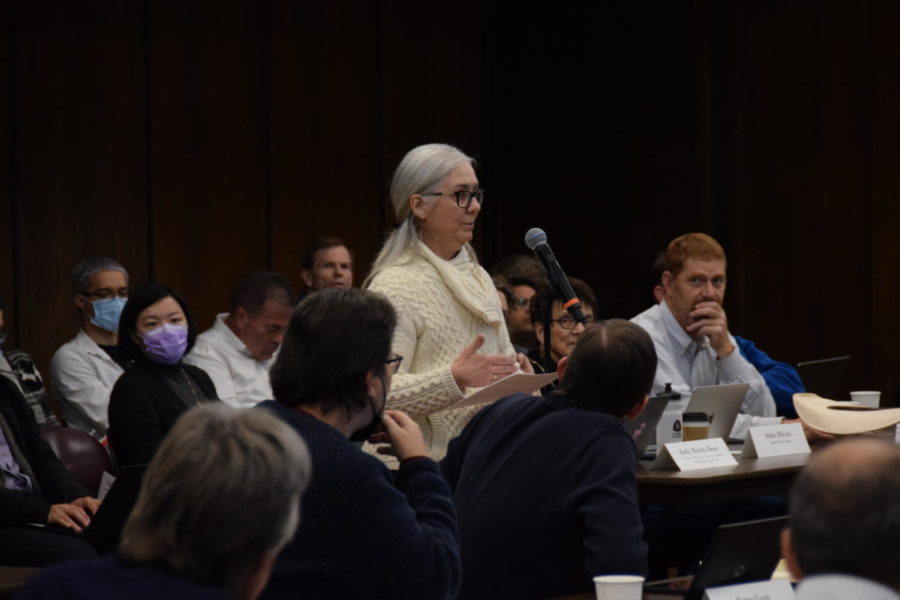Posthumous degrees approved by Faculty Senate
Maura McGrail, associate professor in genetics, development and cell biology, pictured while asking questions on the biomedical engineering major.
The Faculty Senate saw the first reading of a policy to allow Iowa State to award posthumous degrees and discussed an item to allow less formalized disciplining of faculty.
The senate touched on a new policy to allow the university to award degrees to dead students. This would allow families of students who have died to receive a degree to commemorate their efforts, regardless of how close the student was to finishing their degree.
“The university may grant undergraduate degrees posthumously,” said Rahul Parsa, the chair of academic affairs for the Faculty Senate Executive Board. “To be eligible, that deceased student must be in good academic standing [with a] GPA of two or higher, and have completed 32 credits at Iowa State University. I think this is just a nice gesture for… grieving families.”
While most senators agreed it was a good policy and should be approved, Brian Behnken, associate professor in history, suggested an amendment to loosen the restrictions on which students are eligible for posthumous degrees.
“I would say the student that is sadly killed on their way to freshman orientation is just as much of an Iowa State University student as a student that’s killed on their way to graduation,” Behnken said. “So I would move that we strike the ‘and have completed 32 credits’ [portion of the policy] and say a student enrolled and in good standing and leave it at that.”
The policy was amended to allow dead students of any academic standing or level of credit hours to be awarded a degree. After some confusion and an amendment to Behnken’s amendment, the senate approved the policy to be reworded and move towards its second reading during the next meeting.
The Senate approved the policy to be reworded to include students of any academic standing or level of credit hours after an amendment to Behnken’s amendment. The policy will see its second reading at the next Faculty Senate meeting Nov. 15.
The agenda item titled “Progressive Corrective Action” was pushed back to the Faculty Senate Executive Board to be amended after concerns were raised by Cullen Padget-Walsh, a teaching professor in philosophy and religious studies.

Progressive Corrective Action would allow the university to take disciplinary action without filing conduct charges. It is intended to protect faculty from abusive or false misconduct charges and allow for more “low-key” options for disciplining faculty.
“I pretty much like the direction that this policy is going, but there are a significant number of changes I’d like to see,” Walsh said. “And in particular, I think it’s important to keep in mind that we are revising this policy, not just because the old one was unclear, but many faculty felt that was being misused or abused.”
The senate also approved the discontinuation of Latin as an undergraduate and graduate minor, as the program had not been used in recent years.
The Senate approved a new undergraduate minor in Spanish translation and interpretation studies, which Parsa said is in high demand and costs the university little to offer.
A new major in biomedical engineering was also approved, though Ann Smiley, a professor in kinesiology, criticized the task force responsible for constructing the major for relying on the decisions of administrators rather than faculty members.
The senate heard the first reading of an item to remove the drop limit students have for courses, which would allow students to drop an unlimited number of courses throughout their academic careers.
Smiley voiced some concern that the new policy would allow students to take advantage of the system and drop courses in which they are unsatisfied with their grades, but the item ultimately passed to its second reading.
Faculty Senate met Tuesday in the Sun Room of Memorial Union from 3:30 to 5 p.m.; the next meeting will take place Nov. 15.
Your donation will support the student journalists of the Iowa State Daily. Your contribution will allow us to purchase equipment, send our student journalists to conferences and off-set their cost of living so they can continue to do best-in-the-nation work at the Iowa State Daily.













